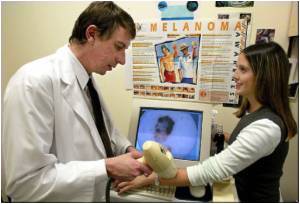About 87,000 people are diagnosed with melanoma, every year. In case of postponements of an individual's biopsy, they are still safe, says a new study.

‘The body of patients diagnosed with cancer are affected, along with their mind and emotions (like fear of death, anxiety, and uncertainty).’





Every year, about 87,000 people are diagnosed with melanoma, according to the American Cancer Society. This most severe form of skin cancer is almost entirely curable if caught before it spreads to nearby (sentinel) lymph nodes.Today, management of high-risk melanomas starts with surgical removal of the layers of skin cancer and a lymph node biopsy, a procedure in which a tissue sample is sent to a lab to check for cancerous cells. Patients with a positive sentinel node biopsy may undergo complete lymph node dissection to lower the risk of recurrence.
In theory, postponing biopsy after a melanoma diagnosis could affect outcomes, either in a negative way by allowing the growth and spread of cancerous cells to lymph nodes, or in a positive way by allowing development of an anti-melanoma immune response.
There have been small studies showing each of those scenarios, said study coauthor Mark Faries, MD, FACS, co-director of the melanoma program at The Angeles Clinic and Research Institute, Los Angeles, Calif.
"We often get questions from patients as to whether or not they need to rush to have their operation performed when they are diagnosed with melanoma. So the question of whether waiting hurts or helps has never been clearly answered," Dr. Faries said.
Advertisements
In this study, the largest one to date, researchers analyzed the effect of delayed sentinel lymph node biopsy on survival of patients with melanoma.
Advertisements
Early and delayed sentinel-lymph node biopsy were defined as less than 30 days and more than 30 days from diagnosis, respectively. Primary outcomes included disease-free survival and melanoma-specific survival.
Of those 2,483 patients, positive sentinel lymph nodes were identified in 432 patients (17 percent). A majority of patients (58 percent) underwent early sentinel-lymph node biopsy. The study found no difference in melanoma-specific survival or disease-free survival in patients who underwent early or delayed sentinel lymph node biopsy. In other words, there was no harm or benefit in waiting 30 days or longer to have a lymph node biopsy.
An independent dataset from the first Multicenter Selective Lymphadenectomy Trial, a multicenter prospective randomized trial, was used to validate these findings. The exact same analysis showed similar results in survival outcomes.
A cancer diagnosis impacts not only the body, but also the mind and emotions. Approximately one-third of patients diagnosed with melanoma report emotional challenges such as fear of death, anxiety, and uncertainty. However, it is important for people to understand that if their biopsy needs to be postponed by several weeks, they are still safe.
"When we talk to patients diagnosed with melanoma, the main rationale is to get the surgical procedure over and done with and get the information and resources they need so that they can move on," Dr. Faries said.
"But people can be reassured that if they are in a situation where, for one reason or another, they need to wait to have an operation, that's okay too."
Source-Eurekalert













